Recently, I faced a challenging experience during a board meeting for an organization. We were all passionate about the organization. There was a decision to be made and a difference of opinions. A fellow board member and I advocated our positions. I went first. Once the floor was my colleague’s, she became my opponent. At that precise moment, my walls went up, and I shut down. She went on the attack, and I sat there confused. We had a common goal. We only slightly disagreed on how to accomplish it. I had no idea how this difference of opinion turned into a duel. I looked to another board member for assistance, guidance, something and he obliged. His points were aligned with mine; he wanted what I wanted. But he managed to neutralize the tension and persuade everyone in the room to consider his perspective. In the end, most, even my opponent, agreed that our idea made the most sense.
How had this happened? He and I had nearly identical visions!
When I asked this question of a wise man I know, he told me simply, “Well, your colleague took a completely different approach. You advocated. He inquired.” and set about explaining the difference between the two. He defined both approaches and gave me tips on how to include inquiry in my repertoire and I am happy to share them with you.
- A point of view can be a dangerous luxury when substituted for insight and understanding. –Marshall McLuhan
Advocacy puts you in a position of “stance”. When you advocate, you are trying to impart or enforce a particular action, position or set of principles. You are trying to persuade by arguing for the position you are advocating.
- Wonder is the foundation of all philosophy, inquiry the progress, ignorance the end. -Michel de Montaigne
Inquiry is an attempt to understand the position of others, rather than change their opinions – at first. Once you consider and appreciate the opposing party’s position, ask questions. Inquire about their point of view. Think and make them think.
- Reason and inquiry are the only effective agents against error. -Thomas Jefferson
When you have spent time to understand and validate the others’ perspective, ask questions that will make them think about your position. For example, “Do we know what this will look like from a budget standpoint?” “What do you think of the financials if we move forward?” Inquiry encourages contemplation. You can phrase the questions in a way that will influence your audience.
This is not to say that Advocacy is the root of all evil. There is a time and place for both approaches; however, often advocacy can interfere and short-circuit communication. Advocacy accounts for a lot of unnecessary conflict, where both sides focus on convincing the other rather than understanding or compromising. Advocacy can breed contempt and doubt.
The next time you are compelled to advocate, pause. Ask questions that will help you understand the other side. Show them that you respect them and want to know more. After all, you likely have a common goal for the result; it’s just a matter of how you get there. Once you understand the alternate point of view, flip to questioning that will make your audience contemplate and consider yours and possibly reconsider theirs. With the right line of questioning, you will be revered as a poised, intelligent leader and your audience will be moved to think and in all likelihood, inspired to act to help you achieve your vision for the common goal.
About Brendan P. Keegan
Brendan P. Keegan is Founder & Managing Partner of velocityHUB, a leading management consulting firm. He is a 5-time industry leading President & CEO of large, private-equity-backed companies and served as the Fortune 100’s youngest Chief Sales Officer for EDS, a $22-billion technology industry leader. Brendan has raised nearly $1.0 billion in capital and returned over $2.2 billion to investors through successful exit strategies. He has trained over 100,000 leaders, led nearly 50,000 employees, driven sales of over $100 billion and worked globally in over 150 countries. Brendan was named a Distinguished Fellow by Dartmouth College, a Fast50 Executive by FastCompany, a successful entrepreneur by Enterprise Bank, Best-of-the-Best CEOs by Incentive, 100 Fastest Growing Companies by PriceWaterhouseCoopers, Business of the Year by NH Business Journal, Top 10 Coach of the Year by USA Football, and Volunteer of the Year by & Youth Coach of the Year locally for his commitment to community service. Brendan is a sought-after speaker by companies across the globe on leadership, sales and performance. He has authored over 200 articles and been published in global publications including the Wall Street Journal, Forbes, Business Week, Fast Company and InformationWeek.
Brendan serves on corporate boards to include Revolution Armor, Merchants Auto Group, ExpressIt Delivery, Olaeris, velocityHUB and nashuaHUB. Brendan and his wife Dana founded the Keegan Courage & Faith Foundation with the goal of giving back $1.0 million for youth education, athletics and at-risk youth across Southern New Hampshire.
About velocityHUB
velocityHUB delivers results-oriented training programs, high-value consulting and targeted executive coaching to many of the world’s leading companies, small and medium businesses, and non-profits. Our vision is to build one million leaders to drive performance, sales and revenue growth.
Contact: Amanda E. Rogers | 603.402.1734 | amanda@velocityhub.com

